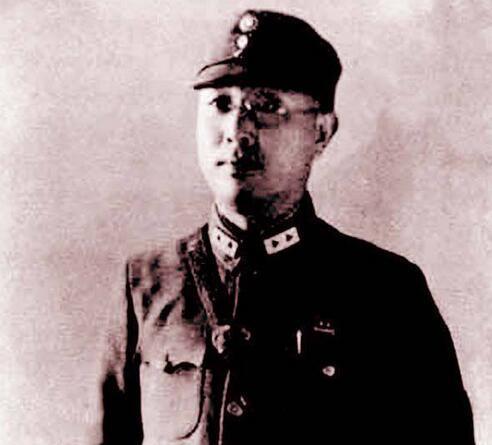Zhang Yi (张轸), a native of Luoshan, Henan, was sent to the Japanese Army Non-Commissioned Officer School in 1919 after graduating a year ahead of schedule at the Baoding Army Officer School due to his excellent academic performance. After returning to China, Zhang Yi first served as a major and lieutenant colonel in the Zhensong Army in Shaanxi Province, and in 1925 he was appointed chief tactical instructor of the Whampoa Military Academy. In 1926, Zhang Yi was transferred to Cheng Qian's 6th Army as the commander of the 56th Regiment of the 19th Division and participated in the Northern Expedition. Because of his bravery in the Northern Expedition, he became Cheng Qian's favorite general and was appointed as the commander of the Sixth Army.

What made Zhang Yi really famous was the Battle of Taierzhuang.
Zhang Yi served as the commander of the Supplementary Second Division under the command of Cheng Qian, leading his troops to participate in the War of Resistance Against Japan, and soon the Supplementary Second Division was reorganized into the 110th Division, and participated in the Battle of Taierzhuang commanded by Li Zongren.
Isn't Zhang Yi the word "wing three"? In order to strengthen the army's prestige, boost morale and expand its influence, Zhang Yi ordered the logistics department to specially produce armbands printed with the word "wing" and uniformly worn on the left arm. And this "wing" word is taken from Zhang Yi's zigzag "wing three". Therefore, the 110th Division was referred to as the "Wing Character Army".
The Battle of Taierzhuang began at the end of March 1938, and during the day, Zhang Yi ordered two artillery battalions to bombard Hanzhuang, posing a great threat to the Japanese army. At night, Zhang Yi ordered the armed forces brigade to use darts, large knives and other weapons to sneak into the Japanese barracks and kill the sentries of the mouth army, which made the Japanese army in Hanzhuang fearful.
By April 23, when the Japanese army formed a siege of Xuzhou, Zhang Yishi was ordered to take over the defense of Jinpi Temple and Wangxian Mountain, and the officers and men of the division fought bloodily with the Japanese army for three days, and then were forced to withdraw from some positions due to the disparity between the crowds. After hearing the news, the commander-in-chief Li Zongren decided to send another division under the command of Zhang Yi to carry out a counterattack against the enemy. After a day of fierce fighting, the division also suffered heavy casualties.
In the Battle of Taierzhuang, Zhang Yi led all the division's soldiers to fight against the Japanese for more than 40 days, and the officers and men of the whole division fought bravely, and were awarded the order of the Supreme Command by the Fifth Theater Command as "the first in mobile warfare". The field newsletter was even reported under the title of "Wing Character Army on the Battlefield of Taierzhuang," which was reprinted by newspapers across the country.
For a time, the name of the "Wing Character Army" shook the whole country. General Zhang Yi became a sought-after anti-Japanese hero, and he was promoted to commander of the 13th Army.
After that, Zhang Yi also led his troops to participate in the Defense of Wuhan and the Expeditionary Force to fight in Burma.
Although Zhang Yi was brave in resisting Japan, he was anti-Chiang Kai-shek in his bones, so he was also hated by the old Chiang's concubines, and was removed from his post as the commander of the 13th Army by Tang Enbo, and later, under the protection of Li Zongren, he was appointed by Chiang kai-shek as the commander-in-chief of the Guerrilla Army in Yu'ebian; he led his troops to participate in expeditionary army operations, but was also dismissed, and later, due to Cheng Qian's dredging, he was transferred to the commander-in-chief of the Henan Southern Advancing Army, director of the Henan Southeast Bureau, and deputy commander of the Tenth Theater of operations of the Kuomintang Army.
After the victory of the War of Resistance Against Japanese Aggression, Zhang Yi served as the chairman of Henan Province.
At this time, the great People's Liberation War broke out, and Zhang Yi saw the justice of the people's war led by the Communist Party, and under the persuasion of all parties, he made up his mind to revolt and join the revolutionary ranks.
In the spring of 1949, Zhang Yi took the initiative to send people to contact the CPC organization in East China to reflect to the CPC Central Committee his intention to decide on an uprising, and sent his son-in-law Zhang Yinren to the Liberated Areas to negotiate directly with Deng Zihui and others. In April 1949, Zhang Yi personally went to Changsha three more times to have secret talks with the veteran army commander Cheng Qian, and agreed that Zhang Yi would act in Changsha before Wuhan and Cheng Qian later.
On May 15, Zhang Yi led more than 25,000 people to a successful uprising and gloriously entered the ranks of the Chinese People's Liberation Army.
After the uprising, Zhang Yi was appointed as the first commander of the Fifty-first Army. After the founding of new China, Zhang Yi transferred to local work and served in the National Sports Commission, but later suffered unfair treatment, and after being rehabilitated in 1979, he served as vice governor of Henan Province. On July 26, 1981, General Zhang Yi died of illness in Zhengzhou at the age of 87.